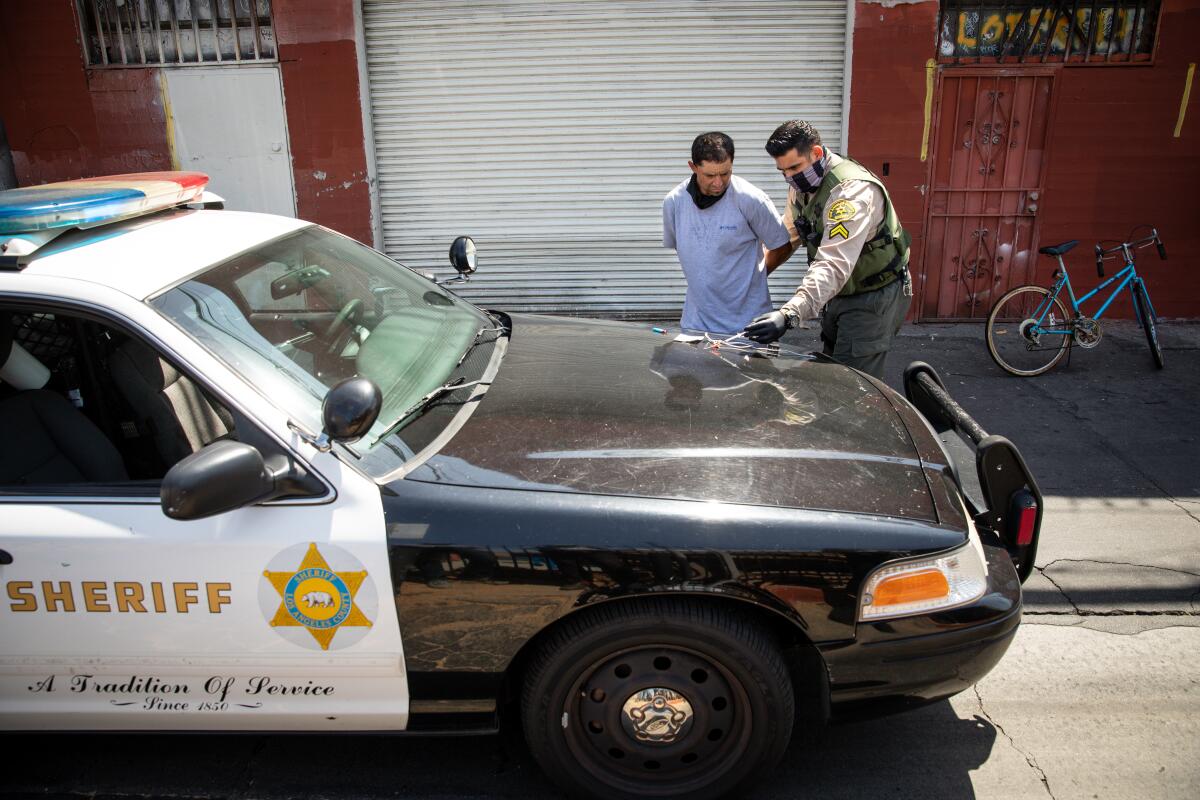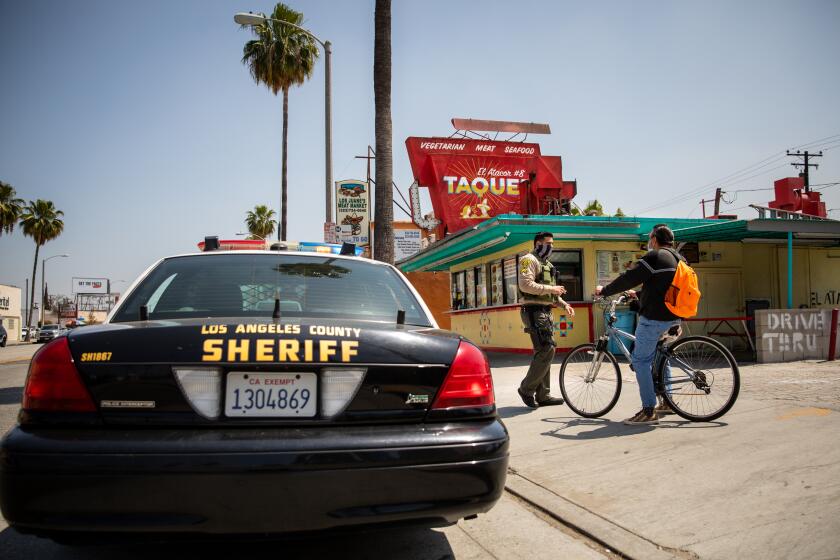Cyclist stops and searches show need for stronger sheriff oversight

- Share via
Perhaps we should call it stop-and-frisk on a bike. That’s the gist of a practice by Los Angeles County sheriff’s deputies to stop cyclists for infractions, or for no apparent reason at all, in order to search and question them.
A Times investigation by reporters Alene Tchekmedyian, Ben Poston and Julia Barajas studied more than 44,000 bike stops by deputies since 2017 and found that Latino cyclists were more likely than others to be stopped. And when stopped, they were more likely than others to be searched — yet less likely than others searched to have contraband. In fact, drugs, weapons and illegal items were found on all searched cyclists less than 8% of the time, the Times analysis showed.
For the record:
9:29 a.m. Nov. 19, 2021This editorial incorrectly reports that the sheriff’s Domestic Highway Enforcement Team was briefly suspended in 2018 after a Times investigation. The program has not been reinstituted.
Those numbers raise the suspicion, to put it mildly, that the Sheriff’s Department is engaging in impermissible racial profiling and using bike stops as an overbearing and ineffective investigative tool to seek out serious criminals. Or perhaps as a very effective tool to harass and humiliate Latinos and other residents of lower-income areas as deputies stop, search and hold them in patrol cars while scanning their records for possible warrants or parole violations.
The bike stops are reminiscent of a Sheriff’s Department program to pull over drivers on Interstate 5 in order to search their vehicles for drugs. A 2018 Times investigation found that the sheriff’s Domestic Highway Enforcement Team disproportionately pulled over Latino drivers, though they were less likely to have contraband than other drivers who were stopped. Internal department investigations and a critical report by the inspector general followed, and the program was briefly suspended.
But amid the improper profiling, the Interstate 5 team at least had some success along the way, recovering more than a ton of methamphetamine, two tons of marijuana and 600 pounds of cocaine. The bike-stop program boasts none of those yields.
Bike stops likewise bring to mind the stop-and-frisk-in-a-car campaign formerly operated in South L.A. by the Los Angeles Police Department’s Metropolitan Division. A pair of 2019 Times investigations found that officers pulled over and searched Black drivers at a rate far out of proportion to their population, and that Black and Latino drivers were searched more often than white drivers during vehicle stops — even though white drivers were found to be carrying illegal items more often.
The LAPD program was part of an effort to tamp down on homicides by searching for illegal weapons. But the department was forced to acknowledge that the returns from the program were meager, especially in light of the anger it left in its wake among drivers who were stopped, removed from their cars and subjected to invasive searches for minor violations, such as broken taillights.
After the first Times investigation into LAPD car stops, Mayor Eric Garcetti ordered the department to alter its practices. After the second — and following criticism from the L.A. Police Commission and the inspector general — LAPD Chief Michel Moore ordered a sweeping redeployment of Metro away from car stops and searches.
The first takeaway from all of these Times investigations, taken together, should be that law enforcement programs can too readily drift into racial profiling and impermissible use of pretextual stops, absent sufficiently vigorous civilian oversight.
The corollary is that the LAPD has that oversight, and the Sheriff’s Department does not.
The police chief has full authority over the day-to-day operation of the LAPD, but department policy is set by the Police Commission (and not, directly, by the mayor, although he appoints commission members, and the City Council signs off on them).
The sheriff has a Civilian Oversight Commission that can subpoena his testimony and can, with the inspector general, initiate investigations. But it cannot, for example, order a change in a department practice after finding that the benefits are too slim to justify the negative consequences. Then-Sheriff Jim McDonnell opted on his own to suspend the Interstate 5 searches. It would be up to current Sheriff Alex Villanueva to alter or end the abusive and discriminatory bike-stop program, but don’t hold your breath. Villanueva reinstituted the Interstate 5 searches. He has been contemptuous of outside critique of any of his practices and policies.
It’s counterintuitive, but elected sheriffs with full control over department policy can be less accountable to the people they serve than their appointed police-chief counterparts, who must always consider the wants and needs of the public. Law enforcement agencies need a measure of independence to do their work, balanced by the accountability of a system of checks and balances. The sheriff isn’t part of such a system. He should be.
His poor performance has elevated a conversation about how to impose better accountability, by opening the job to leaders from outside the profession, granting the Board of Supervisors impeachment power, creating a county police force with an appointed leader or an even broader rethinking of how to provide county law enforcement and public safety.
More to Read
A cure for the common opinion
Get thought-provoking perspectives with our weekly newsletter.
You may occasionally receive promotional content from the Los Angeles Times.










